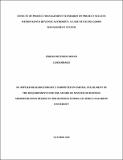Effects of project management standards on project success within Kenya Revenue Authority: a case of Excise Goods Management System

View/
Date
2018-10Author
Miano, Fridah Muthoni
Type
ThesisLanguage
enMetadata
Show full item recordAbstract
Application of project management standards in project implementation increases the probability that the project will attain its objectives. The general objective of the study was to establish the effect of project management standards on the success of KRA projects. The specific objectives sought to explore the effect of stakeholder management, strategic training, project support and monitoring and continuous improvement on success of KRA projects. The researcher used the stakeholder and agency theories. Descriptive study design was used, and the site was KRA head offices Nairobi, Kenya. The target population was the 126 KRA employees who took part in the EGMS project during its design, implementation and rollout. Stratified random sampling was used to select 96 potential respondents. Questionnaire was used to collect data and piloting of the same conducted with 15 employees from KRA so as to test for reliability and validity. Drop-and-pick-later method of questionnaire administration was applied. Analysis of the collected data was done with the aid of SPSS and analysis was through descriptive and inferential statistics (Regression). Study findings revealed that stakeholder management standards (β = 0.307; p = 0.006), strategic training standards (β = 0.555; p = 0.000) and project support standards (β = 0.315; p = 0.002) had a significant positive effect on implementation success of the EGMS project. However, monitoring and continuous improvement standards did not have a significant effect on implementation success of the EGMS project (β = 0.152; p = 0.211). The study makes the following recommendations. First, KRA should ensure that in future projects, stakeholders should be provided with opportunities to provide their input so that the resulting project would meet their expectations and needs. Second, in successfully implementing projects, it is critical for everybody involved in the project including project sponsor, project manager and the project‐team members to have the requisite technical and soft skills. Third, KRA should ensure that in its future projects, support from senior management is indispensable for project accomplishment. Lastly, KRA should ensure that it has a metrics-tracking framework so that the project team can assess what they are accomplishing.
Publisher
Africa Nazarene University
Subject
Project managementProject management standards
Project management standards--Kenya Revenue Authority
Collections
Related items
Showing items related by title, author, creator and subject.
-
Influence of project management practices on the quality of projects within the construction sector in Kenya: a case of Wanjohi Mutonyi Consult Limited
Auka, Lona Mokeira (Africa Nazarene University, 2018-05)Globally, the construction industry is a trillion- dollar industry, which has a significant influence on a country’s development as it contributes, both directly and indirectly, to the global GDP index. Failure to achieve ... -
Influence of project risk management on financial performance of highways construction projects in Kenya: a case of Kenya National Highways Authority
Adema, Lilian Kavochi (Africa Nazarene University, 2018-08)The study examined the influence of project risk management on financial performance of highways construction and maintenance of projects which is a case study of Kenya National Highways Authority. The study objective ... -
The influence of project management maturity on project implementation in the large peer group financial institution in Kenya
Walobwa, Paul Amunga (Africa Nazarene University, 2020-08)Across the globe, studies have shown that the number of projects that are considered challenged or failed is significantly higher than those deemed successful. Further, in an ever intensively competitive market due to ...



